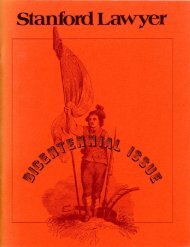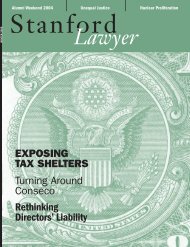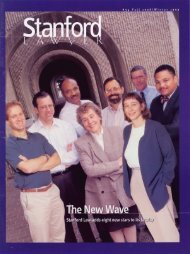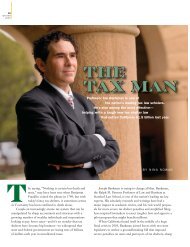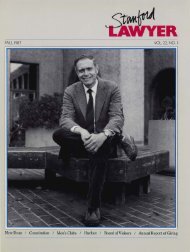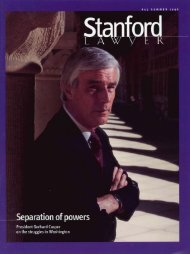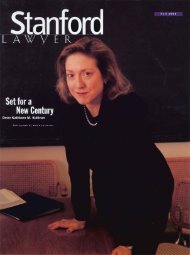Issue 73 - Stanford Lawyer - Stanford University
Issue 73 - Stanford Lawyer - Stanford University
Issue 73 - Stanford Lawyer - Stanford University
You also want an ePaper? Increase the reach of your titles
YUMPU automatically turns print PDFs into web optimized ePapers that Google loves.
DISCOVERY<br />
37<br />
STANFORD<br />
LAWYER<br />
Only where there is a tragedy of the commons<br />
do we insist on complete or relatively complete<br />
internalization of externalities. There is no tragedy<br />
of the commons in intellectual property. A<br />
tragedy of the commons occurs when a finite natural<br />
resource is depleted by overuse. Information<br />
cannot be depleted, however. Indeed, copying<br />
information actually multiplies the available<br />
resources, not only by making a new physical<br />
copy but also by spreading the idea and therefore<br />
permitting others to use and enjoy it. Rather than<br />
a tragedy, an information commons is a comedy<br />
in which everyone benefits.<br />
This doesn’t mean that intellectual property<br />
law is a bad idea. Rather, the basic economic justification<br />
for intellectual property law comes from<br />
what was only an occasional problem with tangible<br />
property—the risk that creators will not make<br />
enough money in a market economy to cover<br />
their costs. Information is different from ordinary<br />
goods because the marginal cost of reproducing it<br />
is so low. In a private market economy, individuals<br />
will not generally invest in invention or creation<br />
unless the expected return from doing so exceeds<br />
the cost of doing so—that is, unless they can reasonably<br />
expect to make a profit. To profit from<br />
a new idea or a work of authorship, the creator<br />
must be able either to sell it to others for a price<br />
or to put it to some use that provides her with a<br />
comparative advantage in a market.<br />
Selling information requires disclosing it to<br />
others. Once the information has been disclosed<br />
outside a small group, however, it is extremely<br />
difficult to control. If we assume that it is nearly<br />
costless to distribute information to others, it will<br />
prove virtually impossible to charge enough for<br />
information to recoup any but the most modest<br />
fixed-cost investments. If the author of a book<br />
charges more than the cost of distribution, hoping<br />
to recover some of her expenditures in writing the<br />
work, competitors will quickly jump in to offer<br />
the book at a lower price. Competition will drive<br />
the price of the book toward its marginal cost—in<br />
this case the cost of producing and distributing<br />
one additional copy. In this competitive market,<br />
the author will be unable to recoup the fixed cost<br />
of writing the book. If this holds generally true,<br />
authors may leave the profession in droves, since<br />
they cannot make any money at it. The result,<br />
according to economic theory, is an underproduction<br />
of books and other works of invention and<br />
creation with similar public goods characteristics.<br />
Intellectual property, then, is not a response<br />
to allocative distortions resulting from scarcity, as<br />
real property law is. Rather, it is a conscious decision<br />
to create scarcity in a type of good in which<br />
it is ordinarily absent in order to artificially boost<br />
the economic returns to innovation. But solving<br />
the “problem” of intellectual property does not<br />
require complete internalization of externalities.<br />
How do the implications of my approach<br />
differ from the free riding argument The critical<br />
difference is that intellectual property law is<br />
justified only in ensuring that creators are able to<br />
charge a sufficiently high price to ensure a profit<br />
sufficient to recoup their fixed and marginal<br />
expenses. Sufficient incentive, as Larry Lessig<br />
reminds us, is something less than perfect control.<br />
Economic theory offers no justification for awarding<br />
creators anything beyond what is necessary to<br />
recover their average total costs.<br />
What’s Wrong with<br />
Overcompensating Creators<br />
The argument so far shows that there is no economic<br />
justification for granting inventors and<br />
creators the right to control positive externalities<br />
flowing from their creations, except to the extent<br />
necessary to enable them to cover their average<br />
fixed costs. But, the reader might object, showing<br />
that there is no need to grant such control doesn’t<br />
compel the conclusion that there is anything<br />
wrong with giving creators greater control over<br />
positive externalities. Wouldn’t it be easier just to<br />
treat intellectual property rights as absolute<br />
There are a number of costs to granting overbroad<br />
intellectual property rights. These costs fall<br />
into five categories. First, intellectual property<br />
rights distort markets away from the competitive<br />
norm, and therefore create static inefficiencies<br />
in the form of deadweight losses. Second, intellectual<br />
property rights interfere with the ability<br />
of other creators to work, and therefore create<br />
dynamic inefficiencies. Third, the prospect of<br />
intellectual property rights encourages rent-seeking<br />
behavior that is socially wasteful. Fourth,<br />
enforcement of intellectual property rights imposes<br />
administrative costs. Finally, overinvestment in<br />
research and development is distortionary.<br />
None of this is intended to suggest that intellectual<br />
property is a bad idea. Far from it. Rather,<br />
the point is that we cannot and should not seek




